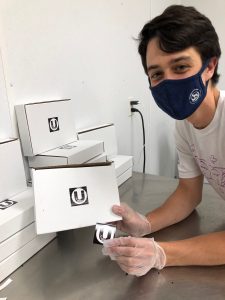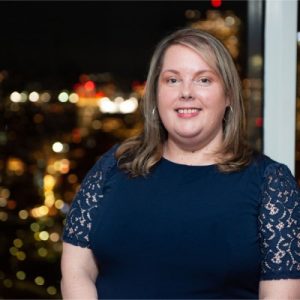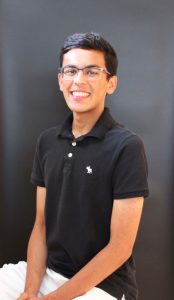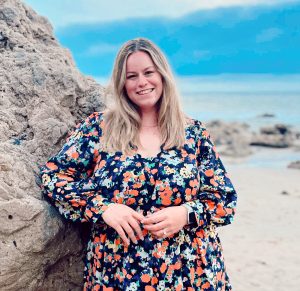Bryce Bisset ’23 (ENG) is studying biomedical engineering at UConn. And, he bakes cookies.
He and a couple friends started a UConn-centric bakery a couple years ago, called Underground Cookies, that delivers the freshly baked treats on Friday and Saturday nights to dorms and apartments around the Storrs campus.
An active member of the Peter J. Werth Institute for Entrepreneurship and Innovation who also runs an entrepreneurship club on campus, Bisset says he always saw the value in networking and mentorship. But his own usual path made him feel “un-mentor-able” in the earlier days of his entrepreneurial journey.

“I think a lot of the people that are going into the Werth Institute are doing it through either really traditional business routes or through things that generally have some type of product with a goal of scaling outside of UConn,” he says. “My business specifically has always been attributed directly to UConn – I’m just a kind of local bakery. And the path I’ve taken for a lot of my entrepreneurial goals has made it so that sometimes it seems like what I’m trying to do is an un-mentor-able situation.”
But what he found through NetWerx – the Werth Institute’s flagship undergraduate-alumni mentoring program – surprised him.
“They have matched me up with mentors before that have somehow found a way to give me some piece of advice or insight into some opportunities that I just didn’t see before,” he says. “A big part of me was trying to figure out how much of my life I wanted my business to take up and, for a while, I thought it could be just about all of it. But because I have so many other goals – as a student, as a person, as a brother, and as a friend – it was hard for me to recognize how I could distribute my time among all the things that I wanted to work on. They provided some advice that really allowed me to balance out and see everything as an array of opportunities that I have, as opposed to just focusing on the business side of things.”
Bisset now has several UConn alumni that he’s met through NetWerx who he considers mentors – and his experience isn’t entirely unique. Students keep coming back to a program that participants on both sides of the mentor-mentee relationships say is unlike other mentoring experiences they’ve seen.
“I think that there’s so much opportunity and value that comes particularly from this mentoring program,” says Bianca D’Agostino ’18 (BUS), who joined NetWerx early on as a mentor and is an ambassador for the program. “There’s a lot of mentoring that happens at UConn, especially in alumni programs and things like that. But I think that this one is super, super special – it has that kind of special sauce.”
‘Who do they have to talk to?’
Since its inception just over two years ago, NetWerx has matched more than 301 UConn student mentees with the 125 alumni mentors who have engaged with its ecosystem.
While the program has evolved over time – growing and changing to meet both student and mentor needs, and adapting to the challenges caused by the COVID-19 pandemic – the goals and mission of the program

are fundamentally the same, explains Julie Gehring, director of mentorship and student development at the Werth Institute.
“Unlike traditional mentorship programs, our goal is to help students who are curious about entrepreneurship develop an entrepreneurial mindset rather than launch a new product or business,” Gehring says.
“These skills – self-reliance, communication, adaptability – are particularly useful for first and second-year students as they transition to college life and try to figure out who they want to become. We want to connect students with alumni to not only their increase their social capitol through networking with fellow Huskies, but also to build their self-confidence. There are so many questions and challenges to navigate during this time in their lives. And who do they have to talk to?”
NetWerx works by recruiting both current students, who apply to participate, and recent UConn alumni who are interested in connecting to create meaningful mentor-mentee relationships.
“Mentorship sometimes has a connotation that you’re going to meet with somebody who is much older than you, but our program is not like that,” Gehring explains. “We’re looking for alumni who are zero-to-15 years out, who have walked Fairfield Way, who have had a bite to eat at Ted’s, and who have that familiarity with the campus, whether it be Storrs or our regional campuses.”
Mentor recruits come from a variety of entrepreneurial industry-related backgrounds – which include, but are not limited to, consulting, fintech, project management, health care, marketing communication, engineering, and start-ups. Mentors commit to a series of five, thirty-minute, one-on-one virtual mentoring sessions over a period of ten weeks. They’re given orientation and training on how to be effective mentors before they’re paired with students through an extensive matching process.

“We don’t use an algorithm – our matching team gets to know both the mentor and mentee through a series of interviews and trainings that enable the matches to be more intentional,” says Gehring, who also notes that students and mentors are often not paired based on their obvious commonalities, but rather on what each might offer to the other that could contribute to sharing and growth for both the mentor and the mentee.
That difference initially surprised Arav Parikh ’25 (ENG), who is studying computer science at UConn and has participated in one NetWerx cohort so far.
“We didn’t actually have the same background, which I was kind of surprised at – I thought it was going to be something similar, but it turned out to be for the better,” says Parikh, who plans to apply to NetWerx again in the future. “His background was more on the business side, and I think he taught me a lot about things that I hadn’t really considered. I’m going into more of an engineering field, and I think it was just great to get that different perspective. He was very open and very willing to share a lot of his experiences, both at college and in the workplace.”
‘Without Strings Attached’
In the one-on-one sessions, NetWerx mentors offer their students business and career advice and often help with résumé and interview preparation or other networking opportunities.
But they also offer advice on soft skills and personal development – things like getting organized, time management, navigating the unfamiliarity of campus and college life, and building confidence in their own abilities.

“A lot of my mentees were really just lost on how to take advantage of what the Storrs campus has to offer,” says Lorraine Carlucci ’17 (CLAS), who majored in communications at UConn and is now a marketing manager for Village Marketing, working with a wide variety of clients on social media influencer campaigns.
“They didn’t know how best to approach their professors to build a deeper relationship with them outside of the classroom,” she says. “They weren’t sure how to find the right internship or volunteer opportunity for themselves. And a lot of them just didn’t really even know what the campus had to offer and what they could pursue outside of the classroom.”
Carlucci, who has mentored several students during her involvement with NetWerx, said one of her mentees was disappointed in her performance during an interview for an internship – after the interview, they talked about her experience in one of their mentoring sessions.
“We walked through all the different questions and answers and tried to pinpoint where it was that she felt she did not best represent herself, where she thought she fell short, but also where she excelled,” Carlucci says. “And then, toward the end of our mentorship, she had another interview, and she felt so confident in her performance. She felt like everything we had talked about she was able to think of in the moment, when she was being asked those questions, and then implement some of the learning that she had from our sessions.
Carlucci says she joined NetWerx because she wanted to help students who were in the same position she saw herself in as a first-generation college student at UConn.
“When I went to UConn, I had no clue what was available to me or what I was doing,” she says. “I just tried my best to figure it out, but I definitely had mentors on campus who pointed me in the right direction. From my perspective, they kind of fell into my lap – it was just a series of events that connected me to them, and I’m really fortunate that I had them throughout my four years. Not everyone ends up in those scenarios where they find someone that they really connect with and that can help guide them through their college experience and even beyond, once they’ve graduated.
“I think the NetWerx program is so wonderful for anybody who is seeking out that type of guidance, but they don’t necessarily know how to find the right person on their own. I think it’s just wonderful to have somebody who’s on your side and there to help you, essentially, without strings attached.”
‘I realized I actually do have a lot to give’
D’Agostino and Carlucci both learned about NetWerx through LinkedIn conversations with staff from the Werth Institute. D’Agostino, who works as a senior marketing manager and SEO strategist, didn’t initially think she had enough experience as a recent graduate to be a mentor, but she soon found otherwise.
“I wanted to join NetWerx because, especially in the peak of COVID, I felt like I wasn’t doing enough to help the world,” she says. “I was hesitant to join at first, because I didn’t think I had the experience to do so. But

I realized I actually do have a lot to give. I’ve been in a lot of these students’ shoes, and my unique perspective can potentially add value to a student. When you can help do that for someone else, that’s awesome, and I think it also helps you realize the value and the impact that you can have on the world.”
Though D’Agostino has offered her guidance to several student mentees during her time with the program, she’s found that working as a mentor has helped her in her own career and with decision-making in her own life as well.
“A common thing my mentees would say is, ‘I don’t really have my life figured out, and I feel like I’m supposed to,’ and I would help guide them through that process, but then also let them know that it’s OK to not have everything figured out,” D’Agostino says. “That came at such a key time for me as well, because during a lot of the core of my mentoring, when I was working with NetWerx more actively, it was coming at a time when I was really thinking about my job and my career and where I really wanted to go.”
She continues, “A lot of these tactics and resources, but also recommendations of accepting where you’re at, is something that I tie into my own life. You can’t be telling a mentee to organize their life one way, and to have all these goals to help make their life better, if you’re not willing to do the same. So, it really just pushes me to be the best that I can be so that I can be a good example for my mentees, and so that when I say it’s OK that you don’t have everything figured out, I embody that same acceptance.”
Now a Career Coach with the program, D’Agostino encourages other UConn alumni who are looking for a way to give back, to inspire the next generation of UConn graduates, or to just reconnect with the Husky community, to give NetWerx a try.
“Everyone has a unique thing that they can learn from you and your experiences,” she says. “You’ll learn a lot about yourself. You’ll be able to positively impact others and get to know your own value and see how you can grow as a person, too.”
For more information about NetWerx and other student and alumni opportunities available through the Werth Institute, visit entrepreneurship.uconn.edu.



